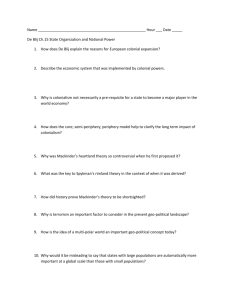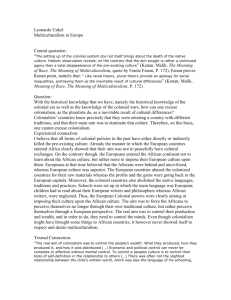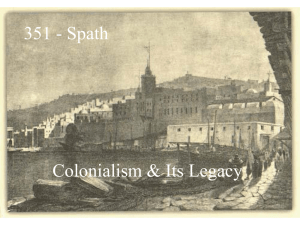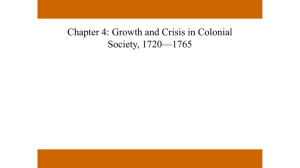Syllabus: Africa from 1800-2000
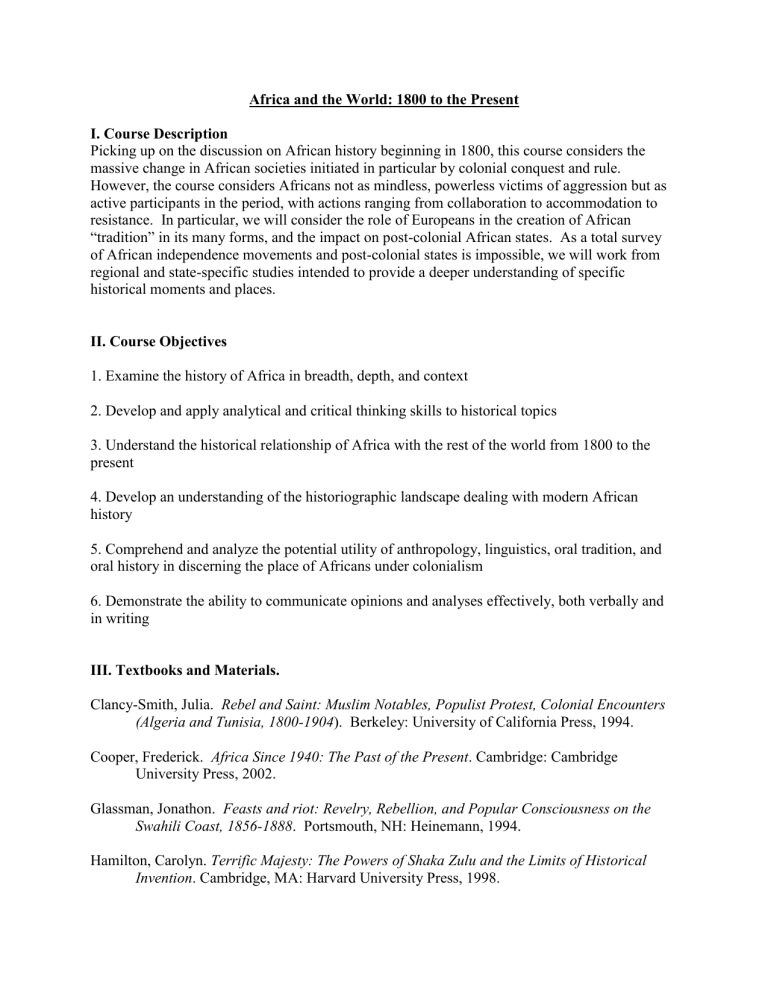
Africa and the World: 1800 to the Present
I. Course Description
Picking up on the discussion on African history beginning in 1800, this course considers the massive change in African societies initiated in particular by colonial conquest and rule.
However, the course considers Africans not as mindless, powerless victims of aggression but as active participants in the period, with actions ranging from collaboration to accommodation to resistance. In particular, we will consider the role of Europeans in the creation of African
“tradition” in its many forms, and the impact on post-colonial African states. As a total survey of African independence movements and post-colonial states is impossible, we will work from regional and state-specific studies intended to provide a deeper understanding of specific historical moments and places.
II. Course Objectives
1. Examine the history of Africa in breadth, depth, and context
2. Develop and apply analytical and critical thinking skills to historical topics
3. Understand the historical relationship of Africa with the rest of the world from 1800 to the present
4. Develop an understanding of the historiographic landscape dealing with modern African history
5. Comprehend and analyze the potential utility of anthropology, linguistics, oral tradition, and oral history in discerning the place of Africans under colonialism
6. Demonstrate the ability to communicate opinions and analyses effectively, both verbally and in writing
III. Textbooks and Materials.
Clancy-Smith, Julia. Rebel and Saint: Muslim Notables, Populist Protest, Colonial Encounters
(Algeria and Tunisia, 1800-1904 ). Berkeley: University of California Press, 1994.
Cooper, Frederick. Africa Since 1940: The Past of the Present . Cambridge: Cambridge
University Press, 2002.
Glassman, Jonathon. Feasts and riot: Revelry, Rebellion, and Popular Consciousness on the
Swahili Coast, 1856-1888 . Portsmouth, NH: Heinemann, 1994.
Hamilton, Carolyn. Terrific Majesty: The Powers of Shaka Zulu and the Limits of Historical
Invention . Cambridge, MA: Harvard University Press, 1998.
Reid, Richard J. A History of Modern Africa: 1800 to the Present . Oxford: Wiley and
Blackwell, 2009.
Straus, Scott. The Order of Genocide: Race, Power, and War in Rwanda . Ithaca: Cornell
University Press, 2006.
Troutt Powell, Eve M. A Different Shade of Colonialism: Egypt, Great Britain, and the Mastery
of the Sudan . Berkeley: University of California Press, 2003.
Turabian, Kate L. A Manual for Writers of Research Papers, Theses, and Dissertations .
7th Edition. Chicago: University of Chicago Press, 2007.
Articles/book excerpts posted on course blackboard site
IV. Graded Work
Graded events include:
Event
Critical Book Review
Mid-term Examination
Research Paper
Participation
Final Exam
COURSE TOTAL
Lesson Due Points
12 100 (17%)
14
29
All
TBD
100 (17%)
150 (25%)
100 (17%)
150 (25%)
600
A. Critical Book Review (Due Lesson 12)
1. This assignment requires that you select a book (see the list below) and prepare a critical review of between 1200 and 1800 words. You will sign up for your review the first week of class. If you would like to review a book not listed below, please talk to me first to ensure it is appropriate. The paper must be completed in Turabian/Chicago Manual of Style method; double spaced; Times New Roman; 12-pitch font; and have one inch margins all around. I will look at rough drafts up to one full lesson prior to the due date if you have questions about format, sources, approaches and style.
A critical book review is not a book report or a summary. It is basically an analysis paper in which you point out strengths and weaknesses of the material, and how it helps in understanding the content of your course. Below is a general outline to assist in your paper:
Introduction: Bibliographical information, selection's topic, author and author's background.
Questions to ask:
Who is this author? Is he or she considered an expert in this topic?
Does the author's background, time, or place affect the conclusions reached? Do you find an obvious bias?
What is the author's point of view or frame of reference (usually found in the introduction or opening paragraphs)?
Selection's thesis and specific examples from the text.
Questions to ask:
What is the author's major hypothesis; what's the purpose for writing this book -- what's
the hook?
What are the most important pieces of evidence to support it?
Your (and/or other reviewers') objections/contrary views. Cite two other reviews of the book in your paper (if available, depending on age of the work).
Consider reviews published in any peer-reviewed historical, sociological, anthropological, or geographic journal. See me or a reference librarian for more specific guidance.
Questions to ask:
What types of sources does the author use? Primary or secondary? Are the sources
reliable?
Does the author’s conclusions and interpretations logically follow from the evidence?
Are there other works on the same or a similar topic?
Does any of the author's information (or conclusion) conflict with other books you've
read, courses you've taken or just previous assumptions you had of the subject?
How does this book fit into a larger conversation or historiography?
Conclusion: Selection's impact on you and other potential readers.
Questions to ask:
Evaluate the book overall. What, if anything, did the book contribute to general
knowledge and understanding of the subject matter?
What were the book’s main highpoints and shortcomings? Why?
Potential Books for Review
Amselle, Jean-Loup. Mestizo Logics: Anthropology of Identity in Africa and Elsewhere , trans. Claudia Royal. Stanford: Stanford University Press, 1998.
Anderson, David. Histories of the Hanged: The Dirty War in Kenya and the End of Empire .
New York: Norton, 2005.
Ayendele, E.A. The Missionary Impact on Modern Nigeria, 1842-1914: A Political and Social
Analysis . London: Longmans, 1966.
Bang, Anne. Sufis and Scholars of the Sea: Family networks in East Africa, 1860-1925 .
London: Routledge, 2003.
Becker, Felicitas. Becoming Muslim in Mainland Tanzania, 1890-2000 . New York: Oxford
University Press, 2008.
Berman, Bruce and John Lonsdale. Unhappy Valley: Conflict in Kenya in Africa . Athens, OH:
Ohio University Press, 1992. [2 volume work – can review either volume]
Brower, Benjamin. A Desert Named Peace: The Violence of France's Empire in the Algerian
Sahara, 1844-1902 . New York: Columbia University Press, 2009
Chanock, Martin. Law, Custom, and Social Order: The Colonial Experience in Malawi and
Zambia . Cambridge: Cambridge University Press, 1985.
Christelow, Allen. Muslim Law Courts and the French Colonial State in Algeria . Princeton:
Princeton University Press, 1985.
Comaroff, John and Jean. Of Revelation and Revolution: Vol. 2, The Dialectics of Modernity on a South African Frontier . Chicago: University of Chicago Press, 1997.
Conklin, Alice L. A Mission to Civilize: The Republican Ideal of Empire in France and West
Africa,1895-1930 . Stanford: Stanford University Press, 1997.
Cooper, Barbara. Evangelical Christians in the Muslim Sahel . Bloomington: Indiana University
Press, 2006.
Cooper, Frederick. Decolonization and African Society: The Labor Question in French and
British Africa . Cambridge: Cambridge University Press, 1996.
Crais, Clifton. The Politics of Evil: Magic, Power and the Political Imagination in South Africa.
Cambridge: Cambridge University Press, 2002.
Elkins, Caroline. Imperial Reckoning: The Untold Story of Britain’s Gulag in Kenya . New
York: Henry Holt, 2005.
Ennaji, Mohammad. Serving the Master: Slavery and Society in nineteenth-century Morocco .
New York: St. Martin’s Press, 1999.
Feierman, Steven. Peasant Intellectuals: Anthropology and History in Tanzania . Madison:
University of Wisconsin Press, 1990.
Hanretta, Sean. Islam and Social Change in French West Africa: History of an Emancipatory
Community . New York: Cambridge University Press, 2009.
Hoisington, William A., Jr. Lyautey and the French Conquest of Morocco . New York: St.
Martin’s Press, 1995.
Iliffe, John. A Modern History of Tanganyika . New York: Cambridge University Press, 1978.
Klein, Martin. Slavery and Colonial Rule in French West Africa . Cambridge: Cambridge
University Press, 1998.
Landau, Paul. The Realm of the Word: Language, Gender, and Christianity in a Southern
African Kingdom . Portsmouth, NH: Heinemann, 1995.
Larson, Pier. Ocean of letters: Language and Creolization in an Indian Ocean Diaspora .
Cambridge: Cambridge University Press, 2009.
Lorcin, Patricia M.E
. Imperial Identities: Stereotyping, Prejudice and Race in Colonial Algeria .
New York: St. Martin’s, 1995.
Lovejoy, Paul and Jan Hogendorn. Slow Death for Slavery: the course of abolition in Northern
Nigeria, 1897-1936 . Cambridge: Cambridge University Press, 1993.
MacGaffey, Janet and Rémy Bazenguissa-Ganga. Congo-Paris: Transnational Traders on the
Margins of the Law . Bloomington, IN: Indiana University Press, 2000.
Mamdani, Mahmood. Citizen and Subject: Contemporary Africa and the Legacy of Late
Colonialism . Princeton: Princeton University Press, 1996.
Mann, Gregory. Native Sons: West African Veterans and France in the Twentieth Century .
Durham: Duke University Press, 2006.
Meillassoux, Claude. The Anthropology of Slavery: The Womb of Iron and Gold . Chicago:
The University of Chicago Press, 1991.
Peel, J.Y.D. Religious Encounters and the Making of the Yoruba . Bloomington: Indiana
University Press, 2000.
Peterson, Derek. Creative Writing: Translation, Bookkeeping, and the Work of Imagination in
Colonial Kenya . Portsmouth, NH: Heinemann, 2004.
Prestholdt, Jeremy. Domesticating the World: African Consumerism and the Genealogies of
Globalization . Berkeley: University of California Press, 2008.
Searing, James. “God alone is king”: Islam and Emancipation in Senegal: the Wolof kingdoms of Kajour and Bawol, 1859-1914 . Portsmouth, NH: Heinemann, 2002.
Sharkey, Heather. Living with Colonialism: Nationalism and Culture in the Anglo-Egyptian
Sudan . Berkeley: University of California Press, 2003.
Trumbull, George. An Empire of Facts: Colonial Power, Cultural Knowledge, and Islam in
Algeria, 1870-1914 . Cambridge: Cambridge University Press, 2009.
White, Owen. Children of the French Empire: Miscegenation and Colonial Society in French
West Africa, 1895-1960 . New York: Oxford University Press, 2000.
Wilder, Gary. The French Imperial Nation-State: Negritude and Colonial Humanism Between the Two World Wars . Chicago: University of Chicago Press, 2005.
B. Mid-term examination
As with most exams, this will consist of a combination of multiple choice, matching and identification, short answer, and essay questions. It is designed to gauge your conceptual grasp of the material; you must be able to identify specific persons, places, and ideas in order to fully understand and/or analyze an historical period.
C. Research Paper
This paper is intended to provide a research outlet for individual student interests. The completed paper should run between 3500 and 5000 words. It should be analytical, not descriptive, containing a solid thesis and a strong evidentiary base. This paper should reference at least ten sources, at least two of which should be primary sources. You may use no more than four legitimate historiographical sites, such as JSTOR, EBSCO Host, official government agencies, or sites ending that in “.mil”, or “.gov.” The paper must be double spaced; Times New
Roman; 12-pitch font; and have one inch margins all around. I will look at rough drafts up until seven days prior to the paper’s due date. Please see the list below for topic suggestions, but note this list is not intended to be all-inclusive—you should exercise your mind in developing a topic that is both realistic and of interest to you.
Strength of anthropology as a mode of inquiry for colonial Africa
Locallly specific discussions of European “tradition” invention or incorporation
Tribe, kinship, and European order in Africa
Islam as site/mode of resistance
The Sahara as link between regions
Interregional connections – economic links, political alliances, intermarriage
Islands and their ties to the main continent – economic, political, cultural, social
The Mediterranean and European links
Early colonial African economic/industrial choices
Ecology and the impact of environment – deserts, forests, savannahs
Slavery, personal relations, and political stability
Slaves as political actors
Slave emancipation and the effect on agriculture, trade, government
Jihad in West and North Africa
Race as artificial measure
Military service in European armies
Medicine as colonial tool
Crime and Criminality
The rise of pan-African thought
Post-colonial governments: moderate, radical, or collaborationist?
Historical foundation of apartheid
The role of oil and/or mineral wealth in post-colonial states
Efforts at African transnational organization
D. Participation
This course is conducted as a seminar. Consequently, it depends on the participation of each enrolled student. Each person has a vital contribution to make to discussion; it is not the place of the instructor or of a select group of students to lead or dominate the room. I will evaluate each student on the quality of participation, as opposed to pure quantity. While a seminar is a forum for discussion and the sounding-out of ideas, it is also a place of learning.
Class time is not the moment to engage in random ramblings of social happenings or illformed thoughts. As with your writing, you should carefully choose your words for their ability to convey, with great precision and economy, your critical analysis of the topic at hand. While I will provide a topic baseline for discussion, I expect students to govern the flow and speed of conversation.
E. Final Examination
While longer, this examination will rely on the same format as the mid-term examination. It will focus on the second-half of the course. However, that does not mean students should dump all knowledge and insight gained prior to the mid-point. Rather, your success on the final examination will hinge on your ability to offer thematic ties across time periods, geographic regions, and people in much the same way the French Empire as historical topic operates.
V. Course Structure
This course generally moves along in a chronological fashion, although the scope of the empire at times makes moves across geography (while remaining in roughly the same place in the chronology) necessary. Block I examines the state of Africa on the eve of colonialism (picking up where the previous African history course left off), paying particular attention to precolonial contacts with Europe and the rest of the world. Block II considers the arrival of European colonialism in a number of forms, from religion to science to the growth of a European imagination regarding the continent. Block III pays particular attention to the varied forms of colonialism, using case studies in North and East Africa to illustrate the distinctions. Finally,
Block IV focuses on independence and the state of post-colonial Africa, with a section specifically devoted to the genocidal horrors of Rwanda.
Week Lesson Subject Assignment
1
1
2
1
2
3
Introduction
Terence Ranger, “The Invention of Tradition in Africa,” in
The Invention of
Tradition , ed. Eric Hobsbawm and Terence Ranger, 211-62
Block I: Approaching Colonialism
Economic and Political Systems in West Africa Richard J. Reid, A History of Modern Africa: 1800 to the Present , 23-41; Paul
Lovejoy, “The Characteristics of Plantations in the Nineteenth Century Sokoto
Caliphate,”
The American Historical Review 84, 5 (1979): 1267-92
Economic and Political Systems in East Africa Reid, 42-63; Jeremy Prestholdt, “On the Global Repercussions of East African
Consumerism,”
The American Historical Review 109, 3 (2004): 755-81
8
8
9
9
7
7
10
10
11
11
12
12
2
3
3
4
4
5
5
6
6
13
13
9
10
11
12
13
14
15
16
17
18
19
20
21
22
23
24
4
5
6
7
8
25
26
Madagascar and South Africa
Case Study: Shaka and South Africa
Reid, 64-76; Pier M. Larson, “’Capacities and Modes of Thinking’: Intellectual
Engagements and Subaltern Hegemony in the Early History of Malagasy
Christianity,”
The American Historical Review 102, 4 (1997): 969-1002
Carolyn Hamilton, Terrific Majesty: The Powers of Shaka Zulu and the Limits of
Historical Invention , 1-71
Hamilton, 72-167
Hamilton, 168-216
Shaka and the Impact of Colonialism
Memory and the Power of the Pre-Colonial in South
Africa
Missionaries and the Place of Religion
Block II: European Arrival in Force
Reid, 111-127; Roger S. Levine, “An Interpreter Will Arise: Resurrecting Jan
Tzatzoe’s Diplomatic and Evangelical Contributions as a Cultural Intermediary on
South Africa’s Eastern Cape Frontier, 1816-1818,” in Intermediaries, Interpreters, and Clerks: African Employees in the Making of Colonial Africa , ed. Benjamin N.
Lawrance, Emily Lynn Osborn, and Richard L. Roberts, 37-55
Exploration and the Redrawing of Africa
French Racial Policy
British Racial Perceptions
Anthropology and the Science of Colonialism
Reid, 128-133; Michael J. Heffernan, “The Limits of Utopia: Henri Duveyrier and the Exploration of the Sahara in the Nineteenth Century,”
The Geographical
Journal 155, 3 (1989): 342-52; Thomas J. Bassett, “Cartography and Empire
Building in Nineteenth Century West Africa,”
Geographical Review 84, 3 (1994):
316-35
Patricia M.E. Lorcin, “Imperialism, Colonial Identity, and Race in Algeria, 1830-
1870: The Role of the French Medical Corps,” Isis 90, 4 (1999): 653-679; Richard
Fogarty and Michael A. Osborne, “Constructions and Functions of Race in French
Military Medicine, 1830-1920,” in The Color of Liberty: Histories of Race in
France , ed. Sue Peabody and Tyler Stovall, 206-36
Richard Phillips, “Heterogeneous Imperialism and the Regulation of Sexuality in
British West Africa,”
Journal of the History of Sexuality 14, 3 (2005): 291-315;
William K. Storey, “Guns, Race, and Skill in Nineteenth Century Southern Africa,”
Technology and Culture 45, 4 (2004): 687-711
Emmanuelle Sibeud, “’Negrophilia,’ ‘Negrology,’ or ‘Africanism?’ Colonial
Ethnography and Racism in France around 1900,” in
Promoting the Colonial Idea:
Propaganda and Visions of Empire in France , ed. Tony Chafer and Amanda
Sackur, 156-67; Douglas H. Johnson, “Political Intelligence, Colonial Ethnography, and Analytical Anthropology in the Sudan,” in
Ordering Africa: Anthropology,
European Imperialism, and the Politics of Knowledge , ed. Helen Tilley and Robert
J. Gordon, 309-35
European Competition, the Scramble, and Imperial
Imaginaries
Reid, 134-44; Peter Merrington, “A Staggered Orientalism: The Cape-to-Cairo
Imaginary,”
Poetics Today 22, 2 (2001): 323-64
Mid-Term Examination None – Review Notes
Block III: Varieties of Colonialism
African Islam
Islamic Response to Colonialism: North Africa
Reid, 81-110
Julia Clancy-Smith, Rebel and Saint: Muslim Notables, Populist Protest, Colonial
Movement and War in North Africa
Zanzibar and the Complexity of East Africa
Encounters (Algeria and Tunisia, 1800-1904) , 11-124
Clancy-Smith, 125-253
Jonathon Glassman, Feasts and Riot: Revelry, Rebellion, and Popular
Consciousness on the Swahili Coast, 1856-1888 , 29-114
German Arrival and the Local Response
Cascading Colonialism: Britain and the Sudan
Indirect Rule in Egypt and the Sudan
Glassman, 146-248
Eve Troutt Powell, A Different Shade of Colonialism: Egypt, Great Britain, and the
Mastery of the Sudan , 26-134
Troutt Powell, 135-216
World Wars and Colonial Ideas
Dissent in the Colonial Order
Towards Independence
Dealing with the Colonial Legacy
Block IV: Entering the Post-Colonial World
Reid, 191-244
Frederick Cooper, Africa Since 1940: The Past of the Present , 20-65
David Anderson, “’Yours in Struggle for Majimbo’: Nationalism and the Party
Politics of Decolonization in Kenya, 1955-1964,” Journal of Contemporary History
40, 3 (2005): 547-64; Tony Chafer, “Education and Political Socialisation of a
A Study in Violence? Algeria and France
National-Colonial Political Elite in French West Africa, 1936-47,” Journal of
Imperial and Commonwealth History 35, 3 (2007): 437-58
Cooper, 156-90; Reid, 300-333
James McDougall, “Savage Wars? Codes of Violence in Algeria, 1830-1990s,”
Third World Quarterly 26, 1 (2005): 117-31; and “Myth and Counter-Myth: ‘The
Berber’ as National Signifier in Algerian Historiographies,”
Radical History
14
14
15
15
27
28
29
30
Post-Colonial Horror: Genocide in Rwanda
Understanding Rwanda Part I
Understanding Rwanda Part II
Course Conclusion and Review
Review 86 (2003): 66-88
Cooper, 191-204; Mahmood Mamdani, “A Brief History of Genocide,” Transition
87 (2001): 26-47
Scott Straus, The Order of Genocide: Race, Power, and War in Rwanda , 41-94
Straus, 175-223
None – Review Notes
VI. Course Administration
1. Plagiarism: Plagiarism is a serious academic and professional issue. Broadly defined, plagiarism is the failure to give credit in your paper for the original ideas advanced by other writers. Be certain to avoid even the appearance of wrongdoing by carefully consulting your instructor and course materials in order to ensure proper documentation. Bear in mind that instructors have the right to award no credit for an assignment that they believe to be intellectually dishonest.
2. Textbook Policy: This course requires reading in a number of books viewed as important to the field. I highly recommend you own each of these books, all of which are on sale at the bookstore. You are expected to complete the reading, regardless of ownership, and to have the text available for discussion during course meetings.
3. Paper Policy: Students are not allowed to pass in the same paper for two different courses.
Students may write papers on the same topic for different courses, but there should be no more than 25% commonality between papers. Each paper should include substantially different bibliographies and footnotes that reflect significant additional research.
4. Instructor Conferences: I will be available Monday through Friday for consultation; an appointment is highly recommended. If you make an appointment and cannot keep it, notify your instructor as early as possible but always prior to the appointed time.
5. Absences from Class: If you miss a class, you must check with a classmate or your instructor to see what was discussed or assigned. Your instructor is NOT responsible for notifying you that you missed important notices or significant course material. You should arrange to take any required make-up exams within 24 hours of your return. If hospitalized, contact me so that we can arrange a plan for you to complete work.
6. Cell Phone Usage: All phones should be off during the class meeting. You should not answer, speak on, or receive/send texts with your cell phone while we are meeting. I will deal with violations of this rule on a case-by-case basis.
7. Laptop Usage: You are permitted to use a laptop during class SOLELY for the purpose of taking notes. You should not use the time in class for facebook, twitter, e-mail, or any other nonacademic purpose. Any violations will result in the immediate cessation of computer use.
